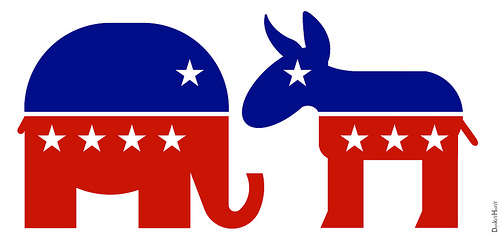Yale and George Mason University recently asked American Republicans and Republican-leaning Independents about their views on energy and climate change.
The good news: There are ways to find common ground across political divides.
Republicans prefer clean energy as America’s energy future
A large majority of respondents (77 percent) support using clean, renewable energy in the US much more (51 percent) or somewhat more (26 percent) than it is used today. Among those who support expanded use of clean energy, 69 percent feel we should be taking action immediately.
Only 9 percent think we should use clean energy less in the future and only 8 percent think the amount we’re using now is just right.
A slight majority (52 percent) supports using fossil fuels in the US much less (21 percent) or somewhat less (31 percent) than we do today. Among those who’d like to see less fossil fuel use, the most common preference is to do it “immediately” (52 percent).
Notably, the terms that resonate most for describing energy types are “fossil fuel”—over terms like conventional energy or dirty energy—and “clean energy”—rather than terms like renewable or advanced.
Perceived benefits of clean energy outweigh the perceived costs
A majority of the respondents feel that taking steps to reduce our fossil fuel use will benefit the nation in a number of ways. The most popular benefit for this group is “freeing us from dependence on foreign oil”—66 percent. Close behind is “saving resources for our children and grandchildren to use”—57 percent, in a dead heat with “providing a better life for our children and grandchildren”—56 percent.
The numbers dropped from there. Notably, 46 percent think cutting fossil fuel use would improve people’s health. Forty-three percent felt it would “protect God’s Creation,” and 41 percent said it would create jobs and strengthen our economy. Not too shabby. Only 30 percent said it would limit climate change or improve our national security.
The good news is that none of the potential costs associated with cutting fossil fuel use were seen as likely by a majority. In fact, respondents selected more benefits than costs (51 percent of benefits were selected vs. 33 percent of costs, on average.) Smallish numbers—a quarter or fewer—of respondents believe cutting fossil fuel use would “interfere with the free market,” “harm poor people more than it helps them,” or “undermine American sovereignty.”
Respondents were asked which potential benefit is most important to them personally. Freedom from dependence on foreign oil again came out on top, this time by a much wider margin—48 percent—compared to only 14 percent for “saving resources for our children and grandchildren,” and 11 percent for providing a better life for their kids and grandchildren. Despite this drop off, the concept of providing a better life for our kids and grandkids is where we find the most common ground with more progressive audiences.
On the flip side, when asked which cost was of greatest concern to them personally, the top choice was “more government regulation” (42 percent), trailed a fair distance by “rising energy prices” (only 31 percent), and costing jobs and harming the economy (a mere 15 percent). Clearly the perceived costs elicit a less intense reaction than the potential benefits.
In light of all these costs or benefits associated with cutting fossil fuel use (and after the battery of survey questions concerning costs/benefits), by a margin of almost 2 to 1 (64 to 35 percent), conservative respondents say the US should take action to reduce our fossil fuel use.
A majority understands climate change is happening and supports a US response
A slim majority of respondents (52 percent) knows climate change is happening, while 26 percent think it isn’t, and 22 percent “don’t know.”
When presented with one of two conservative arguments saying Americans should respond to climate change, a solid majority (62 percent) agrees that “Americans absolutely should” (23 percent) or “probably should” (39 percent) take steps to address it.
One argument focused on human health and clean air and water, and also included the Ben Franklin adage that an ounce of prevention is worth a pound of cure; the other emphasized the importance of accountability for the true costs of pollution in our free-enterprise system. Each fared about the same—garnering above 60 percent agreement.
Only 1/3 agrees with Republican Party positions on climate and 1/2 on energy
Only a minority of respondents (35 percent) agrees with the Republican Party’s position on climate change (a plurality “neither agrees nor disagrees”), while a slight majority (51 percent) agrees with the GOP position on meeting America’s energy needs.
Electeds are perceived as unresponsive to citizens’ views on climate
Few respondents (less than 20 percent) think people like themselves have influence over what their elected officials think or do regarding climate change. The majority (62 percent) says “I don’t think elected officials care much about what people like me think about climate change.”
So how do we talk about climate change and energy solutions across party lines? Here are some tips (these are especially powerful when used in conjunction with the winning three-part climate narrative published here recently.)
[flashcard]
Finding Common Ground on Climate
- Americans of all political stripes agree that clean energy is the right direction for our country—and the faster the better.
- Americans agree we should cut our fossil fuel use. By freeing ourselves from oil dependence, we will have a stronger economy. And we all want to provide a better life for our kids and grandkids.
- Americans across the political spectrum are ready for leadership on energy and climate. We know we can rise to today’s energy challenges and succeed. And nothing should stand in our way.
[/flashcard]


Comments are closed.